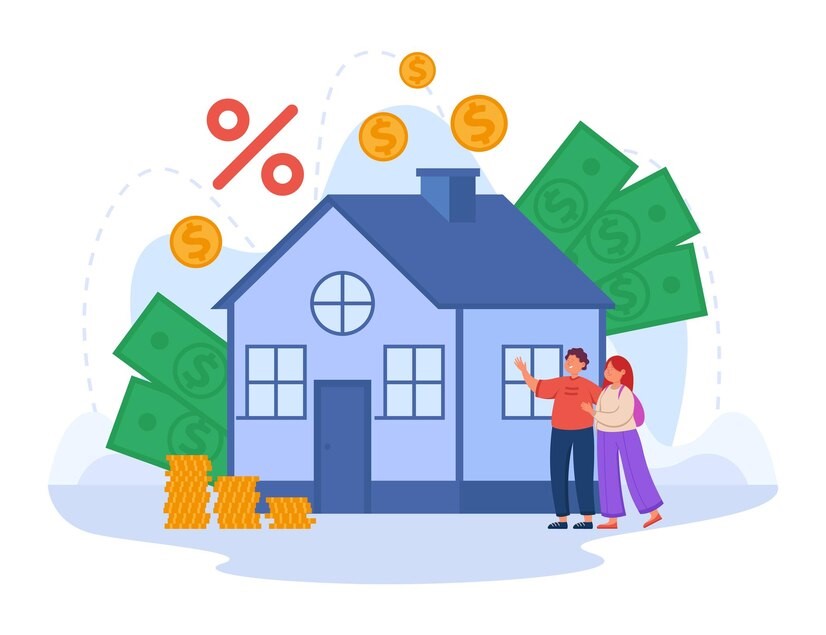Introduction
Purchasing a new home can be quite daunting, and with the recent economic changes, it has become even trickier to make this dream achievable.
FHA loans and conventional loans have become the go-to options for many potential borrowers, and they come with their own set of pros and cons. However, a substantial number of borrowers weigh FHA loans as the most suitable option.
so, why is that? FHA loans offer lower down payments and financial flexibility, which is a boon for various borrowers, especially first-time homeowners.
In this blog, we will break down why homeowners are choosing FHA loans over conventional loans and which one is the better fit to navigate the challenges of the existing financial landscape.
Getting to Know FHA and Conventional Loans: What’s the Real Difference?
If you are considering which loan option is the best for you, here is an easy comparison of their major aspects to help you make an intelligent choice:
| Feature | FHA Loans | Conventional Loans |
| Credit Score | 580+ for 3.5% down payment; flexible | 620+ ; stricter requirements |
| Down Payment | 3.5% minimum | Typically 5%, sometimes as low as 3% |
| Mortgage Insurance | Required for loan term | Required if <20% down, but can be removed |
| Loan Limits | Set limits by region, often lower | Generally higher; includes jumbo options |
| Ideal For | Low savings, lower credit scores | Strong credit, higher down payment ability |


‘Understanding the key pros and cons of FHA and conventional loans and why borrowers with financial and credit score challenges weigh in FHA loans while those flexible property options prefer conventional financing.’
Why Are FHA Loans Becoming a Go-To Choice for Homebuyers Right Now?
Let us understand why various homebuyers are considering FHA loans California as a smart and feasible choice for financing their houses and making it look like an easily achievable dream:
A Safety Net You Can Count On
- FHA loans offer that cushion of extra security as they are backed by the federal administration, which encourages lenders to provide financing to borrowers even with less-than-perfect financial credit portfolios.
- For buyers, this added stability results in secure financing options during times of economic uncertainties as lenders may offer favorable loan terms knowing that their risks are eventually going to be mitigated up to a certain level.
Leeway with debt–FHA’s Got Your Back!
- When it comes to debt-to-income ratios, FHA loans do not weigh upon stricter ratio approaches, unlike conventional loans. This means that even if you have existing loans, you still stand a fair chance to qualify for FHA loans.
- So, if a major chunk of your income gets exhausted in repayment of existing debt along with the challenges of increased living costs and job cuts, FHA loans are the perfect mortgage option that works in, and not against your financial reality.
Lock in a Better Rate With FHA
- One of the major advantages of FHA loans in California is offering competitive interest rates even in unpredictable economic conditions. Uncertainty in the economy usually results in higher interest rates but FHA loans often provide a slight edge over conventional loans, especially for new homeowners or those with a weaker credit history.
- Let us understand how FHA loans help in managing monthly repayments even with a stringent budget while generating potential savings through this example:
| Loan Type | Interest Rate | Loan Amount | Loan Term | Monthly Payment (Principal & Interest) | Total Paid Over 30 Years |
| FHA Loan | 6.50% | $300,000 | 30 years | $1,896 | $683,097 |
| Conventional Loan | 7.00% | $300,000 | 30 years | $1,996 | $718,675 |
| Difference | $100/month | $35,578 |
Pay Less Upfront to Get Into Your New Home
- FHA loan lenders demand a down payment as low as 3.5% of the total amount, unlike traditional financing which requires a larger down payment of up to 20%. This serves as a major benefit for first-time FHA loan borrowers with limited savings who wish to start their home-owning journey without having to save for years.
- Also, potential buyers who are struggling due to persistent economic distress can also approach FHA loans to fulfill their dreams of purchasing a house.
No Perfect Credit? No Problem with FHA
- FHA loans are lenient when it comes to considering borrower’s creditworthiness, making them a great alternative for buyers with a not-so-perfect credit score.
- Traditional financing usually requires a credit score of 700 or above, while FHA loan buyers can secure financing with a score as low as 580 or lower, even in some cases involving substantial down payments.
- This encourages buyers whose credit scores have been affected by personal and financial obstacles to start fresh financially and build their dream homes that might otherwise have been rejected altogether from the market.
Conclusion
For homebuyers with low funds and poor credit, FHA loans are a great choice since they provide flexibility and a simple application procedure that eases financial strain. In today’s uncertain market, FHA loans provide a pathway to homeownership sooner. However, every homebuyer’s journey is unique, and different financing options may better support long-term goals.
Munshi Capital is here to guide you—whether you’re exploring FHA loans, conventional financing, or alternative options—to ensure you make informed decisions and are set up for success.
Read More: FHA Loans for a Second Home: Requirements and How to Qualify
Frequently asked questions
- What is the California FHA mortgage loan limits?
As of 2024, FHA mortgage limits in California range between $400,000 to over $1 million for high-cost areas like Los Angeles, etc. but it still may depend on which county you are considering for investment.
- Can I refinance FHA loan California?
Yes, FHA offers FHA Streamline Refinance to borrowers involving less documentation and no home appraisals, to benefit from the lower interest rates.
- What types of properties are eligible for FHA construction loans?
Single-family homes or in some cases multi-family units (up to four units) where at least one unit is used for primary residence can be financed through an FHA construction loan.





